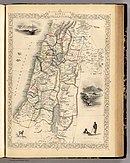Women in Palestine

| Part of a series on |
| Women in society |
|---|
 |
One of the main determinants of the role of Palestinian women is the structure of the family which may be a nuclear unit, a transitional unit, or a hamula unit (hamula means "extended family", the most common family structure in Palestinian society). The significant influences to the rights of women in Palestine are the patriarchal tradition and the teachings of the Quran. In general, expecting parents in Palestine prefer having males because the boys carry "the name of the family and secures" the continuity of the family line and strengthens the likelihood of its economic stability. On the other hand, female Palestinians were not expected to secure income for the family, but women were expected to adapt to the customary roles of women in Palestinian society wherein females were traditionally molded as inferior to men.[1]
However, there had been a gradual change in the attitudes of parents regarding the education of their Palestinian daughters since the middle of the 1970s. From the middle part of the 1970s, several numbers of Palestinian women achieved education from universities, instead of only receiving education at the secondary level. Reasons for the change of parental attitude were the "increased demand for women on the labour market", changes in the status of the economy in the West Bank territory, the "economic interests" of the parents, and the idea that a well-educated Palestinian woman has a better place and opportunity on the "marriage market". In addition to this, armed with earned education, an unmarried daughter can financially support herself and her parents.[1]
Palestinian women have a long history of involvement in resistance movements inside the Occupied Territories and in countries such as Jordan, Syria, and Lebanon. They established many feminist-nationalist organizations, including the Palestinian Federation of Women's Action Committees in the West Bank and Gaza.[2]
Despite of the change in parental views, however, contemporary women in Palestine are reported to be experiencing adversity due to political discord, Israeli occupation, and the "denial of full rights and protection by Palestinian society" in general.[3]
A survey by the Palestinian Central Bureau of Statistics from 2011 showed that 35 percent of married women in Gaza had been on the receiving end of physical violence by their husband during the previous twelve months, and that 40 percent of unmarried women had been physically abused by a member of their household.[4] In 2013, UNRWA canceled its annual marathon in Gaza after Hamas rulers prohibited women, including Palestinian women from Gaza, to participate in the race.[5]
The Effect of Israeli Aggression on Palestinian Woman
The Israeli-Palestinian conflict has seriously affected the Palestinian women. Millions of women were banished and displaced from their homelands after the 1948 Arab-Israeli War. Majority of them are still refugees. Many measures taken by the Israel Defense Force (IDF) have affected the Palestinian women's physical, psychological,health, education, economic security.[6]
Even though there are a few number of Palestinian female combatants, they suffer the biggest share of harm. For example, they suffered extreme horror, loss of security, hyper nervousness and other kinds of disorders. Throughout the prolonged history of wars from 1948 till 2014, women were targeted and humiliated from Israeli forces who turned a blind eye on the international human rights conventions.
Euro- Mediterranean Human Rights Monitor published a joint report on 17 December 2014, entitled “Edge’s Flowers”.[7] It documents the sufferings of Palestinian women during the 2014’s Israeli offensive on Gaza Strip 2014. It showcases the Israeli violations for the rights of the Palestinian woman. It confirms that Israel has definitely used the disproportionate power through targeting the neighborhoods arbitrarily, without paying any attention to the necessary precautions to protect the life of the civilians especially women and children. 489 female victims were reported during the 2014 Israel- Gaza conflict, also known as Operation protective Edge. The reports states that that last offensive left 11,314 displaced women in the school shelters. Legally speaking, these practices are direct violation for the humanitarian international law especially Geneva Conventions 1949 and its additional protocol 1977. Article (76) of the first additional protocol states that women must receive special respect. Article (17) also confirms that puerperal women must be lifted from the besieged areas. Despite all these conventions, Israel violated them and committed the worst violations against the Palestinians generally and women especially.
See also
- Women for Palestine
- Palestine women's national football team
- General Union of Palestinian Women
- Palestinian costumes
- Islamic marital practices
References
- ^ a b Manasra, Najah. Palestinian Women: Between Tradition and Revolution
- ^ Hasso, Frances S. Resistance, Repression, and Gender Politics in Occupied Palestine and Jordan (Syracuse University Press 2005).
- ^ Palestinian women 'suffer doubly', BBC News, March 31, 2005
- ^ Odgaard, Lena (25 March 2014). "Upsurge in Palestinian 'honour killings'". Al Jazeera English. Retrieved 25 March 2014.
- ^ UN Cancels Gaza Marathon
- ^ "The Impact of the Conflict in the Occupied Palestinian Territory on Women". www.mediterraneas.org. Retrieved 2015-10-18.
- ^ Human Rights Monitor, Euro- Mediterranean (26 august, 2014). "http://www.euromid.org/uploads/reports/Crushing_Flowers_AR.pdf" (PDF). جرف الزهور. Retrieved 18 October 2015.
{{cite journal}}: Check date values in:|date=(help); External link in|title=

